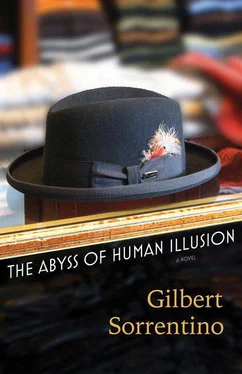More to the point, really, is the true cause of the nausea not the poems themselves but that they were written by his friend? That’s what he should face: does he despise him? His friend is a great success in the small, almost always weaselly world of poetry, its sweaty ambitions, its minuscule rewards, its grim teaching appointments, its pathetic prizes, its insincere enthusiasms. His friend’s career grew and blossomed by means of — of what? It is this carefully built career that the man won’t look at, won’t face. He picks up the book and riffles the pages. Oh for Christ’s sake, think it, say it. By means of a determined transformation. His friend, an arrogant, selfish, cruel, egocentric yet charming man of sociopathic bent, to put the very best face on it, changed, oh yes, transformed his public presence into one of a subtly nuanced and delicate humility, transformed his entire life and world into the very picture of the sensitive artist, forever grateful and decently but not egregiously or embarrassingly humble before the attentions paid him, oh yes indeed. Thanks, thanks, thanks, he can hear him, thanks, so wonderful to be here, how kind of you all.
He sits in glum silence, thinking, knowing that the whole truth that he has admitted, if it is truth, is too tawdry to be sad, too banal to be bitter. Why, though, has it taken him so long to realize, to admit that his friend, his caring, concerned friend, warmly open to the earth and all the men and women on its roiling and corrupted surface, is not only a relentlessly self-promoting careerist, but worse, a third-rate poet? The fault is his, but he will not, he will never examine it.
They had decided to go on what Basil called an “excursion” into the mountains, such as they imagined them, and so quickly set off. Soon they reached a little town, most of which seemed to be — was, in fact — an old-fashioned amusement park, replete with all manner of rides, many of which, like the Tunnel of Love and the Ferris Wheel, struck the travelers as quaint, and perhaps pointless. They were, however, pleased, although Louise was embarrassed when a jet of air, suddenly released from a hole in the floor over which she was standing unawares, blew her skirt up around her waist. Her blushes pleased a leering clown who was, apparently, “in charge” of the air jet. The mountains seemed to be just outside the town, although it became apparent that the town was deep within the mountains. “Perhaps this is the excursion,” Alex said.
Later, after a lunch of hot dogs and cotton candy, they agreed to separate so as to “explore” the amusement park and environs, and to meet later in the day by a ride called the Big Lasso, and Basil, Harry, and Anna left. Alex looked around for Louise but she had gone somewhere without so much as a word. At the hour appointed for their rendezvous, Alex obediently stood before the Big Lasso, but nobody showed up, so he spend much of the afternoon watching ferries sail to and from Platinum Carde Island, out in the middle of a startlingly turquoise-colored artificial lake. He felt abandoned and hurt, especially when, later, they returned and asked him where he’d been all day. He turned away, reddening with anger.
Harry told him to “hop” into his convertible, which he called, for some reason, “Jewish blue,” and said that he’d always wanted to see the Sixty-ninth Street pier in Brooklyn, from which, he’d read, real ferryboats once made regular runs to and from Staten Island, at the time wholly unpopulated save for a few dozen Boy Scouts who had been forbidden to return to the “mainland” because of sexual thoughts that they had been unable to suppress despite prayers and chats with their ministers and coaches: they were no longer “clean” or “reverent,” or so Boys’ Life reported. Harry turned onto Sixty-ninth Street and headed for the pier.
But once outside the car a few steps found them in a field of mud through whose gluey expanse they had to slog before they could reach the pier, which they could see quite clearly ahead of them; it was crowded with people, and drenched with spray from the very rough waters of the Narrows. They scraped the mud off their shoes and walked, finally, onto the pier. Basil, Louise, and Anna were sitting at a table under an umbrella, drinking beer. Basil lifted a glass in exaggerated greeting. “My beer is Rheingold, the dry beer,” he said. “Think of Rheingold whenever you buy beer.” “You never intended to meet at the Big Lasso,” Alex said. “You spent the whole day here!” Harry shook his head and told Alex to relax. “We were not here all day at all,” he said, “You think everything is an excursion.” Anna laughed drunkenly, but then gave Alex a threatening look. “He’s always thought everything’s an excursion. This whole dumb idea is his, isn’t it?” Alex realized that he’d lost his shoes. “Look!” he said. “Look! Look! Who’s going to buy me some new shoes? These were Flagg Brothers square-toe loafers, dyed cordovan!” He was overwhelmed by a childish rage. “You never intended to meet at the Lasso,” he said. “What friends!” They all looked at him, amused yet slightly annoyed. “Oh well,” Basil said. “What a beautiful day it is anyway, right?”
He and his wife of a little more than a year decided to give a New Year’s Eve party for their closest friends, another recently married couple: it would just be the four of them. They were, then, surprised to find that their friends had brought along a man from the husband’s office, Zoltan, whom the husband described as his “partner.” He seemed a rather inconsequential figure, pale and faded. He sat on one end of the sofa and began to drink bourbon and water, steadily, and with a kind of sincere devotion to the whiskey. The hostess had what she would have called — had she been asked — a “bad feeling” about him.
It became clear to the host, despite the blurring of his thought by alcohol, that Zoltan had sexual designs on his coworker’s wife, who pretended to be blind to his unconcealed desire. That she permitted her skirt to ride up to her thighs testified to her awareness, even though she worked so as to seem blithely careless. It was, after all, New Year’s Eve, she might have said. Zoltan ogled her thighs with an ardor just slightly less pronounced than his love for his whiskey, but this was allowed to pass by all. Who can tell why? Relationships, as they now call them, faint, stumble, and collapse every day because of such social niceties: all Zoltans seem to know this, with the instinct of animals.
Sometime just before midnight, when the little party had become somewhat waywardly morose despite the good-times Ray Charles recording that nobody had the will to dance to, the doorbell rang, and the visiting wife, the guest, assuming the hostess’s duties, opened the door to Jake, an old friend of both husbands. He stood there smiling, a quart of Scotch in each hand, his coat flung carelessly over his shoulders. He put the Scotch on the floor and took his friend’s wife in his arms, then kissed her, as they say, passionately, his mouth open, as was hers. He had his hands as low on her waist as he, perhaps, dared, but his intentions were very clear. His candor seemed merely his attempt to disguise them with “honesty.”
Zoltan got up from the couch, and lurched toward the couple, patting, in some absurd gesture of comfort, his host’s shoulder on the way to the door. He pulled Jake away from his “partner’s” wife and then pushed his mouth into hers, lewdly, slobbering, grunting, rubbing his hands up and down her thighs. Her husband got up, very calmly, walked to the couple, and kicked his wife in her buttocks before pulling her around to face him; then he slapped her face and slapped her face again. The record had ended, and as if caught in the perfect web of the perfect cliché, the voices of people in the street were suddenly clear in their strained and vaguely hysterical revelry.
Читать дальше












